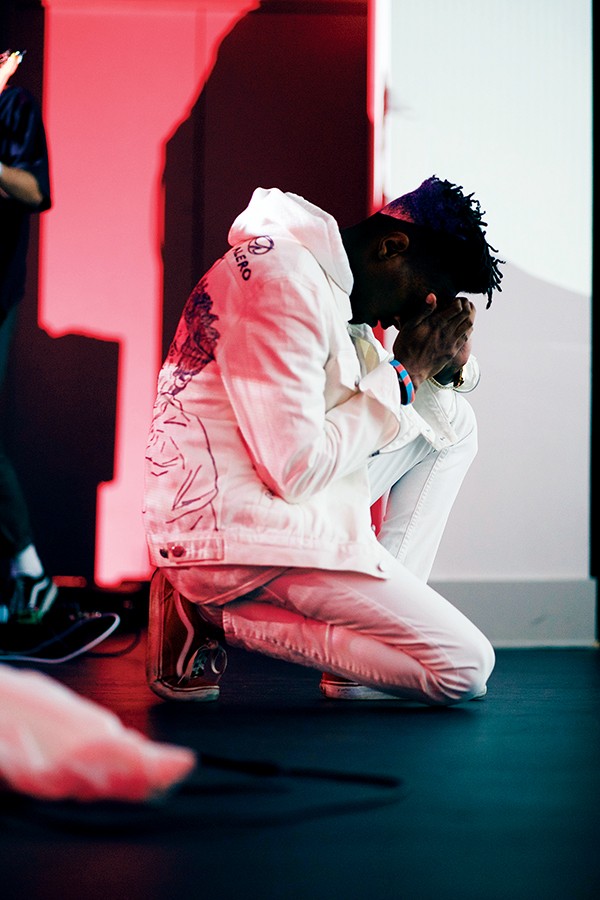I’m searching for Don Lifted’s East Memphis crib, but I’m not sure which house on the crowded street is his. Then I see the battered Oldsmobile in the driveway. It’s the trusty, mid-sized domestic sedan immortalized in the title of his new album, Alero.
“The suburbs are a pause for me,” he says.
The nine songs on Alero evoke a particular moment in his life when he didn’t have a place to pause. Before he was Don Lifted, Lawrence Matthews’ girlfriend Aleq went to college in Washington, D.C., and he enrolled in a Baltimore school to be near her. “I was on my own for the first time. I had never traveled outside of the South.”
But the constant crush of people and personal turmoil threw him for a loop. “I had some demons I had to get out about that time period. It was a time that I had a lot of frustrations, but I had extreme longing for that time and place and the experiences I had there. I wanted to relive them. The reality was, it was beautiful, but it was bad at the same time. I was poor; I got kicked out of school; I was struggling. I don’t want to say it was drugs. … I was being young and dumb about what I was putting in my body.”
Matthews returned to Memphis, but Aleq stayed in D.C. to finish her schooling. For him, that meant a lot of driving back and forth. “It’s a record about the time period spent in the car.”
Eventually, he got a degree in art from the University of Memphis. “I did everything. I was a photographer, painting, sculpture work, installations, everything. I decided to focus on painting because at the time, that was what people knew me the most for.”

At the same time Lawrence Matthews’ visual art was gaining traction, Don Lifted’s music was struggling. At first, he was making beats for rappers, but when he heard the finished songs, he always was disappointed with the results. “I knew I was writing better songs than these people. So I started writing my own songs and making mixtapes,” he says. “I have to be in control. I now understand that about myself. I make decisions based on maintaining control over what I do.”
These days, the control extends to the venues where he plays. The artist’s first gigs were multi-artist showcases in traditional club venues. “I always had very elaborate visions of ways I wanted to see and express my music. … It’s an all-encompassing art experience. In these group shows, you can’t really do your own thing. You just have to be a person on the stage. That’s not why I’m doing it. I’m not doing it to just be a performer. That’s just an element of the greater scheme. After a couple of bad experiences, I decided I’m never doing that again. I have to have my own stuff, to sell and curate my own performances and experiences. It started at Crosstown Arts and then branched off from there.”
In mid-April, he became one of the first musical acts to play in the Brooks Museum’s downstairs theater, utilizing multiple digital projectors to create layered, moving images over the stage while he performed songs from Alero, his prior album, December, and some new material. “Art comes easier. Music is a challenge to me. … Being the guy who has to perform these lyrics I wrote, that’s hard. I get stressed about that. I have extreme doubts and extreme confidence in myself musically.”
The autobiographical Alero mixes chillwave synths with twisted and chopped samples. Don’s verses are quick and staccato, sounding sometimes as if the ideas and memories are coming too fast for him to keep up. “I’ve done a lot of projects, but that was the only one that flowed out like that. It happened really quickly.”
For the accompanying videos, he teamed up with Crosstown Arts’ Justin Thompson for “Harbor Hall,” and filmmaker Kevin Brooks for “It’s Your World” and “Take Control of Me.”
“I want to make as many videos as I can. I want to tell the stories through great videos,” he says. “I need people who are just as maniacal and controlling about what they do as I am about what I do.”
The mastering for Alero took place at Bernie Grundman’s Mastering studio in Hollywood, California, with Kendrick Lamar’s engineer Mike Bozzi. For Matthews, it was a life-changing experience — and one that reinforced his determination to stay in Memphis. “When I was in Los Angeles, I thought ‘I could come out here, like everyone else is coming out here, and I could make it out here.’ But every time I do something [in Memphis], the impact is much deeper and more spiritual. They don’t need me in Los Angeles. They don’t need me in New York.”